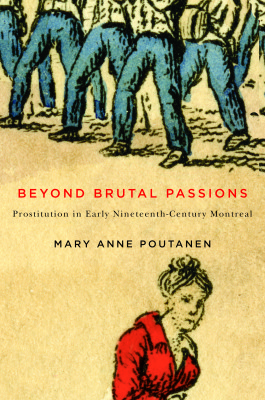The written histories of cities usually tell the big stories, hashing out biographies of visionary men building things and founding things and fighting one another for the spoils. In Beyond Brutal Passions, Mary Anne Poutanen delves into the details to create a portrait of Montreal’s early nineteenth-century prostitutes, scouring city archives for moments when the lives of these mostly forgotten women intersected with official public record.
Her account relies heavily on police and court documents, but Poutanen isn’t only interested in tracking when and how prostitution was policed and punished (although she does that, too). She teases out the roles that brothel owners, streetwalkers, and female vagrants played in their communities as mothers, wives, friends, neighbours, and co- workers. While she’s frank about the hardships they faced – violence, larceny, poverty, homelessness, police extortion, Dickensian prison conditions, and the perils of vagrancy during Montreal’s bleak winters – Poutanen’s subjects weren’t just isolated, desperate wretches. They were independent women who relied on themselves and one another to get by.

Beyond Brutal Passions
Prostitution in Early Nineteenth-Century Montreal
Mary Anne Poutanen
McGill-Queen’s University Press
$34.95
paper
432pp
9780773545342
She also complicates these women’s relationships with state institutions. She cites several streetwalkers, for instance, who would contrive to be arrested, often with the complicity of watchmen or constables, in order to use jails for free medical attention while giving birth, for palliative care, or to avoid sleeping rough when winter loomed. Such stories show the agency and resistance women exercised in hijacking resources for themselves, their families, and their communities.
Covering a period from roughly 1800 to 1840, the book is structured in two sections, the first focusing on the women, the second treating police, legal, and carceral systems. Poutanen deftly weaves these together, arguing that changing bourgeois attitudes toward public space, domesticity, and femininity led to more paternalistic and repressive attitudes and laws toward prostitution and vagrancy. The sexual and economic freedom of women who stepped outside of male-run household economies was seen as a threat that might contaminate “unsullied” women of good character. And so police, jurists, and local government disciplined them by criminalizing prostitution and punishing infractions more harshly.
Clearly intended for a scholarly audience, Beyond Brutal Passions is academic in tone and structure, addressing a reader already well versed in this period of Montreal’s history. Poutanen, who lectures at both Concordia and McGill, really digs into the minutiae of her materials to frame her larger argument, and this meticulousness might strike the casual reader as tedious at times. A lengthy introductory exegesis on her research methods, for example, would be something anyone outside of her field could safely skip. That said, her archival research is expansive, offering bait for any local history buff, and the volume marks an important contribution to feminist historical literature, recuperating the lost stories of nineteenth-century Montreal’s popular class and especially its disorderly women.
At the heart of this work lies the conviction that prostitutes weren’t just prostitutes. They were working women who sold sex to stay alive, to support their families, to survive abusive or absent husbands. Poutanen interrogates the dichotomy struck between the prostitute and the good wife and mother, giving voice to the women who were both. mRb






0 Comments